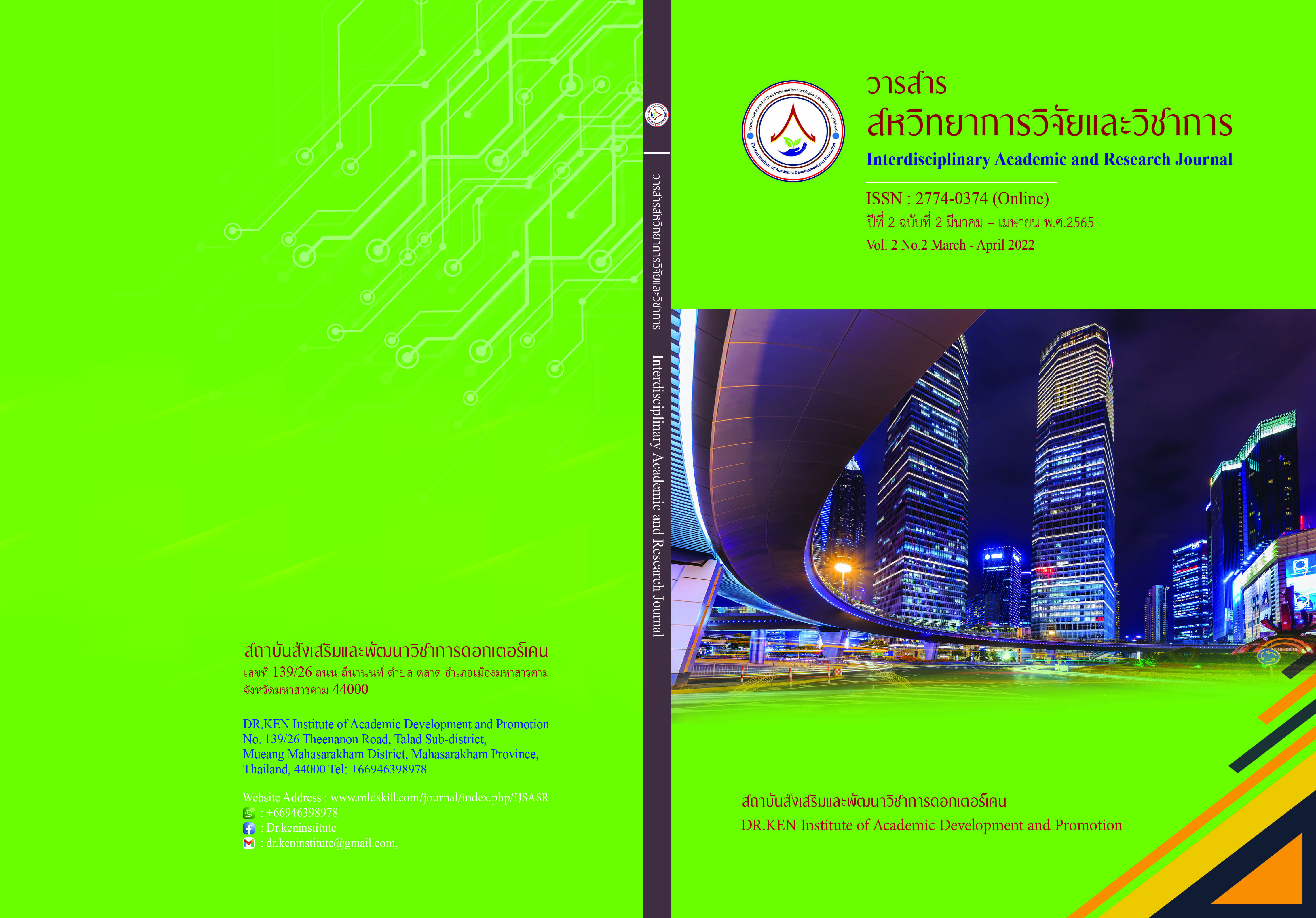Political Power Construction: Conditional Factor and Process
DOI:
https://doi.org/10.14456/iarj.2022.21Keywords:
Politics; , Power Construction; , Conditional Factor; , ProcessAbstract
Although Thailand faces problems with democratic governance, the government has seriously tried to solve the problem, trying to promote democracy in the community by decentralizing the governance to the locality so that people in village sub-districts can participate. Governing at both local and national levels. However, politicians entering the political system tend to aim primarily for personal gain and political gain. The rise to power of politicians can be broken down into several issues or methods depending on the circumstances, the environment, and the abilities of each individual. The results of a study of the process of networking and local political organization were based on the following key points: (1) The prestige of the family (got the opportunity). (2) Build a network of local power bases. (3) Being a synthetic socialist (accessible and dependable). (4) Neutral coordination of all systems (overground, underground, etc., white, gray). (5) Develop public policy innovations (massive spatial development). (6) Relationship with the national political power base. And (7) the role of government at all times.
References
เดชะ สิทธิสุทธิ์. (2541). การสร้างฐานอำนาจทางการเมืองของกลุ่มการเมืองในการเมืองท้องถิ่น: ศึกษาเฉพาะกรณีกลุ่ม "สันติธรรม" ในเทศบาลเมืองนครปฐม. บัณฑิตวิทยาลัย, จุฬาลงกรณ์มหาวิทยาลัย.
เสาวนีย์ ชินสิทธิรัตน์. (2550) การนำนโยบายการกระจายอำนาจการปกครองสู่ท้องถิ่นไปปฏิบัติ: ศึกษาเฉพาะองค์การ บริหารส่วนตำบลพลวง กิ่งอำเภอเขาคิชฌกูฎ จังหวัดจันทบุรี. วิทยานิพนธ์ รป.ม. (นโยบายสาธารณะ) : มหาวิทยาลัยบูรพา.
โกวิทย์ พวงงาม. (2550). การปกครองท้องถิ่นไทย : หลักการและมิติใหม่ในอนาคต. พิมพ์ครั้งที่ 2.กรุงเทพฯ : วิญญูชน.
ชาญชัย จิตรเหล่าอาพร. (2558). ความรู้เบื้องต้นทางรัฐศาสตร์.มหาวิทยาลัยราชภัฏวไลยอลงกรณ์ ในพระบรมราชูปถัมภ์ปทุมธานี : สำนักพิมพ์มหาวิทยาลัยรังสิต.
ธรรมรัตน์ โพธิสุวรรณปัญญา. (2562). การสร้างฐานอำนาจของผู้นำทางการเมืองท้องถิ่น. วิทยานิพนธ์หลักสูตรปริญญารัฐศาสตรดุษฎีบัณฑิต (รัฐศาสตร์) มหาวิทยาลัยราชภัฏมหาสารคาม.
ธีระพล สุคนธวิท. (2540). การขึ้นสู่ตำแหน่งนายกรัฐมนตรีของนายชวน หลีกภัย (พ.ศ. 2512-2535). บัณฑิตวิทยาลัย, จุฬาลงกรณ์มหาวิทยาลัย.
ประภาส ปิ่นตบแต่ง. (2558). กระบวนการมีส่วนร่วมทางการเมืองกับพัฒนาการทางการเมืองไทย. ใน เอกสารการสอนชุดวิชา 80203 ปัญหาพัฒนาการทางการเมืองไทย. ฉบับปรับปรุงครั้งที่ 2. นนทบุรี : สำนักพิมพ์มหาวิทยาลัยสุโขทัยธรรมาธิราช.
ประมวล รุจนเสรี. (2548).การใช้อำนาจเป็นธรรมชาติของมนุษย์. พิมพ์ครั้งที่ 5. กรุงเทพฯ :ฐานข้อมูลศูนย์สารสนเทศสิทธิมนุษยชน.
พรอัมรินทร์ พรหมเกิด. (2556).สังคมวิทยาการเมือง.ขอนแก่น : โรงพิมพ์มหาวิทยาลัยขอนแก่น.
พิชญ์ณิฐา พรรณศิลป์. (2558).บทบาทของผู้บริหารท้องถิ่นในศตวรรษที่ 21, วารสารสันติศึกษาปริทรรศน์ มจร, 3 (2),146-161.
ยศสันติสมบัติ (2533). อำนาจ บุคลิกภาพและผู้นำการเมืองไทย. กรุงเทพฯ : มหาวิทยาลัยธรรมศาสตร์.
สุรวุฒิ ปัดไธสง. (2536). อำนาจและทรัพยากรทางการเมือง : ศึกษากรณีจอมพล ป.พิบูลสงคราม. กรุงเทพฯ: สถาบันวิจัยพฤติกรรมศาสตร์ มหาวิทยาลัยศรีนครินทรวิโรฒ ประสานมิตร.
Badie, Bertrand, Dirk Berg-Schlosser, and Leonardo Morlino (2011). International encyclopedia of political science. Thousand Oaks, Calif.: SAGE Publications. Phwng-ngam.
Becharach, S. B., and Lawler, E. J. (1981). Power and Tactics in Bargaining. Industrial and Labor Relation Review, 34, 219-233.
Dahl, Robert A. (1957). The Concept of Power. Behavioral Science 2, no. 3 (December 11, 1957) : 201–15.https://onlinelibrary.wiley.com/doi/abs/10.1002/bs.3830020303.
Gamson, W.A. (1968). Power and Discontent. Evanston, IL.: the Dorsey Press.
Linz, Juan J. & Stepan, A. (1998). Problems of democratic transition and consolidation: Southern Europe, South America, and post-communist Europe. Baltimore: Johns Hopkins Univ. Press, 1998, 3 – 4.
Linz, Juan J. (2001). Totalitarian and Authoritarian Regimes. Ronald A. Francisco Contemporary Southeast Asia. 23 (1), 185-187.
Weber, Max. (1966). The Theory of Social and Economic Organization. New York: The Free Press.
Wright, C. Mills. (1959). The Sociological Imagination. Oxford University.
Downloads
Published
How to Cite
Issue
Section
License
Copyright (c) 2022 Kittiyakan Doangpakdeeram

This work is licensed under a Creative Commons Attribution-NonCommercial-NoDerivatives 4.0 International License.
Copyright on any article in the Interdisciplinary Academic and Research Journal is retained by the author(s) under the under the Creative Commons Attribution-NonCommercial-NoDerivatives 4.0 International License. Permission to use text, content, images, etc. of publication. Any user to read, download, copy, distribute, print, search, or link to the full texts of articles, crawl them for indexing, pass them as data to software, or use them for any other lawful purpose. But do not use it for commercial use or with the intent to benefit any business.
















.png)


